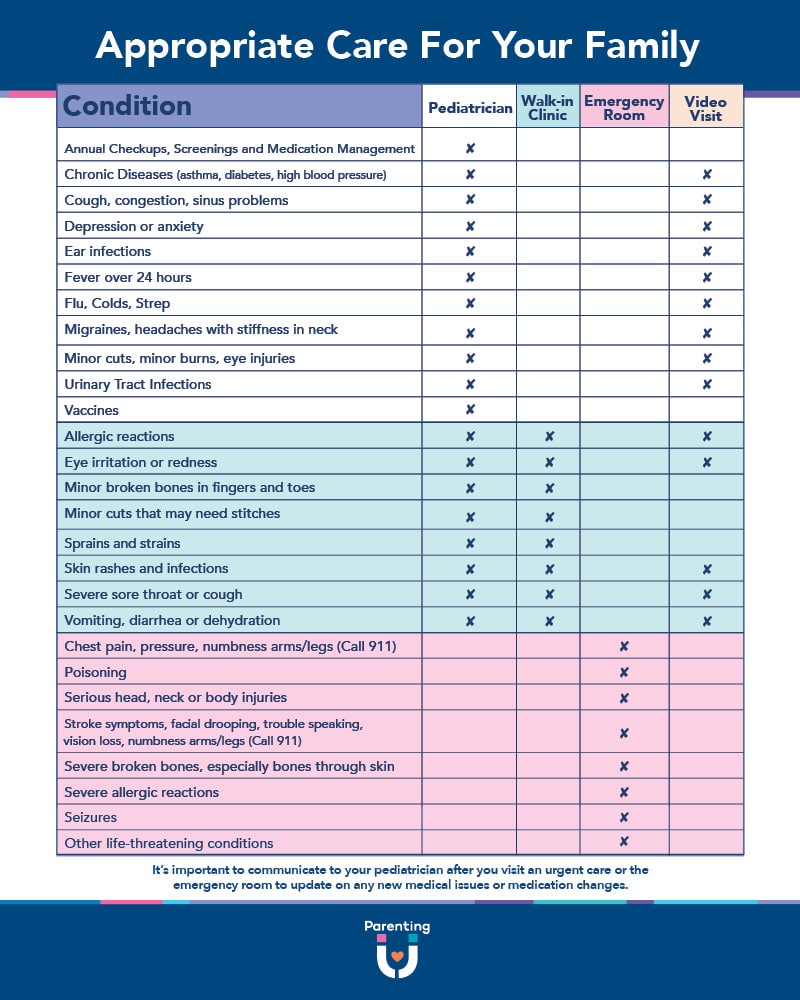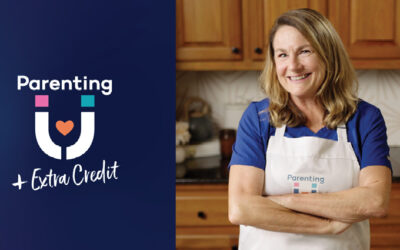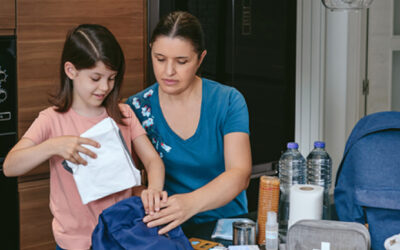As parents, we’ve all been there — the nerve-wracking moment when our child twists an ankle during a soccer game or develops a sudden bout of mysterious stomach pains, and of course, it always seems to happen outside of regular office hours. Panic can set in, and suddenly we’re faced with the dilemma of where to seek care.
In this episode of ParentingU, Hannah Chachere, MD, Our Lady of Lourdes Children’s Health pediatrician, offers her guidance to help parents stay calm and make informed decisions during those urgent times.
When in Doubt – Call Your Pediatrician
Dr. Chachere, a mother herself, understands the overwhelming nature of these situations all too well.
“I always tell parents to step back for a moment and take a deep breath,” she says. “Your child means everything to you, so knowing where to go from here is key.”
But how should parents determine the next step? Dr. Chachere suggests a simple yet effective approach: start by reaching out to your pediatrician, even after hours. Many pediatrician offices, including Dr. Chachere’s, maintain an on-call service precisely for these scenarios.
“Call your pediatrician,” she advises. “Explain what happened and ask whether it’s something that can be managed at home or if immediate attention is necessary.”
Dr. Chachere also says to trust your intuition as a parent.
“I always ask: what is your mom gut telling you?” she says. “Mom guts are a really good thing, and we should trust them. More often than not, you’re right.”
Importance of Establishing Pediatric Primary Care
Having an established relationship with a pediatrician or other primary care provider is important beyond just having someone to call during an emergency.
Pediatricians provide comprehensive routine care, while also being equipped to address acute concerns, offering point-of-care testing for respiratory infections, strep throat, flu and COVID-19.
“In our office we handle a wide range of issues, from routine well-checks and vaccinations to managing chronic conditions like anxiety,” Dr. Chachere says. “We’re here to alleviate worries. Whether it’s fever, suspected urinary tract infection or concerns about flu symptoms.”
Establishing a relationship with a pediatrician offers parents not just medical expertise but also peace of mind, knowing that their child’s health and well-being are in caring and knowledgeable hands.
Understanding the Difference Between Urgent and Emergent Care
What type of care? It can be tricky, but we’re here to help. A call to a trusted healthcare provider can provide in-the-moment guidance. Our “Where to Go When” quick guide can also help:

Swallowed foreign objects may be emergencies. “If it’s a battery or magnet (that has been swallowed), it’s a trip straight to the ER without hesitation,” Dr. Chachere says. However, she notes that items like pennies may be less urgent but still require evaluation, often through X-rays.
Other conditions Dr. Chachere identifies as warranting urgent attention include seizures, suspected broken bones with significant symptoms, infants under two months with fever, chest pain, heat stroke or instances where a child has fainted.
Understanding the difference between urgent and emergent care can help parents navigate healthcare choices more effectively.
Urgent care addresses immediate concerns but may not require the specialized interventions of an emergency room. In contrast, emergent situations demand immediate interventions and access to specialists capable of managing critical conditions.
Dr. Chachere explains that urgent care and walk-in facilities offer timely solutions for non-life-threatening issues, akin to an after-hours pediatrician’s office, while emergency departments are equipped to handle more severe or life-threatening situations.
Video Visits and Optimizing Communication
Our children’s health network provides a number of ways for parents to connect with pediatricians, including video visits, which can provide timely and appropriate treatment for non-urgent and non-emergency care needs.
“Nowadays we’re doing more virtual visits, expanding services to accommodate busy schedules and unforeseen circumstances,” Dr. Chachere says. Those video visits extend beyond routine care, addressing a range of medical concerns.
For example, for conditions such as ADHD, anxiety and depression, video consultations can alleviate stress associated with in-person visits and foster a more comfortable environment to discuss sensitive mental health topics.
Effective communication is key to exceptional pediatric care, empowering parents to make informed decisions in collaboration with their trusted pediatrician. In addition to phone calls, parents can send direct messages via MyChart to ensure an ongoing conversation to allow timely intervention and personalized care for each child’s unique needs.
First Aid Tips
When it comes to minor cuts and injuries, having some basic first aid knowledge is invaluable for parents. Dr. Chachere shares practical tips to handle them with confidence.
For minor scrapes and cuts obtained during outdoor play, Dr. Chachere advises thorough cleansing of the affected area. She recommends using antiseptic solutions such as Hibiclens or chlorhexidine gluconate to effectively disinfect the wound. Following cleansing, applying a layer of Aquaphor or Vaseline can promote healing and prevent secondary infections. These simple yet time-tested remedies can often suffice for minor injuries.
While many minor wounds can be managed at home, it’s important to monitor them closely for any signs of worsening or infection. Dr. Chachere emphasizes the importance of observing for redness spreading from the wound site, increased pain or the presence of fever. These symptoms may indicate a need for further evaluation by your pediatrician.
Providing comfort care and monitoring symptoms at home can be effective until families can seek evaluation during regular clinic hours.
Looking for a natural remedy for sore throat and cough for kids older than a year? Dr. Chachere recommends honey.
Navigate Emergencies with Confidence
In moments of uncertainty and concern for our children’s health, having a trusted pediatrician by your side can make all the difference. Dr. Chachere’s compassionate approach and valuable insights are sure to resonate and help parents feel empowered and better equipped to navigate any pediatric emergency with confidence.
Reach out to your pediatrician whenever you have questions or concerns, and remember to trust your instincts. With the support of your pediatric care team, you can navigate any pediatric emergency with calmness, clarity and confidence.




